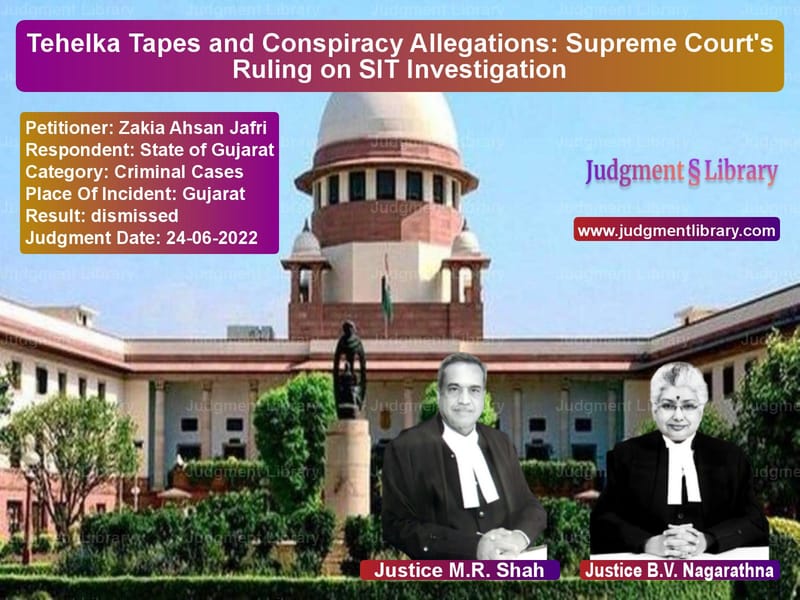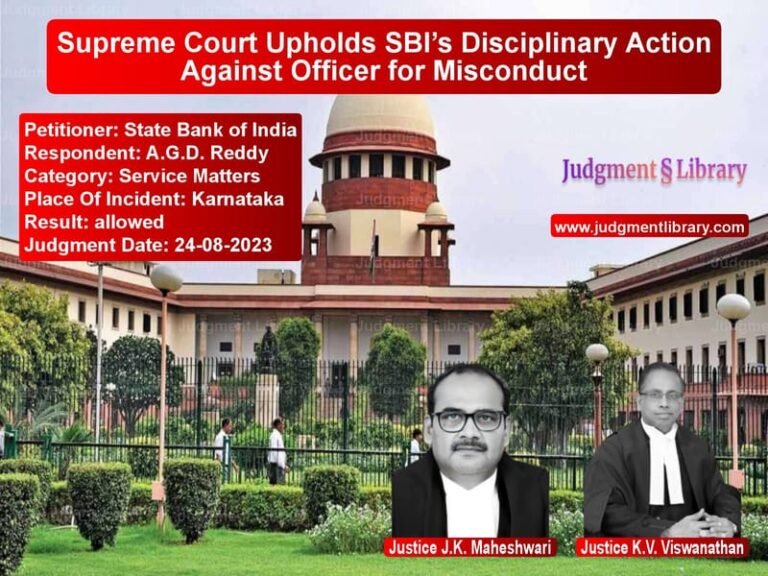Tehelka Tapes and Conspiracy Allegations: Supreme Court’s Ruling on SIT Investigation
The Supreme Court recently delivered a judgment in the case of Zakia Ahsan Jafri v. State of Gujarat, which examined the authenticity of the Tehelka Tapes and allegations of a larger conspiracy related to the 2002 Gujarat riots. The case was built around the claim that the state machinery was complicit in orchestrating the violence. The petitioner sought an independent investigation into a larger conspiracy beyond individual acts of violence, alleging systematic involvement of political leaders, bureaucrats, law enforcement agencies, and religious organizations.
Background of the Case
The case revolved around the communal violence that erupted in Gujarat in 2002. The petitioner, Zakia Jafri, the wife of Congress MP Ehsan Jafri who was killed in the riots, alleged that the state failed to control the violence and that there was a conspiracy at the highest levels. She challenged the findings of the Special Investigation Team (SIT), which concluded that there was no prosecutable evidence to support the allegations of a larger conspiracy.
Petitioner’s Arguments
The petitioner contended the following:
- The SIT failed to conduct a comprehensive and impartial investigation into the broader conspiracy that allegedly fueled the Gujarat riots.
- The Tehelka Tapes contained confessions and statements from individuals admitting to active participation in the violence, which should have been admissible as substantive evidence.
- The prosecution failed to examine key witnesses and incorporate crucial testimonies, resulting in an incomplete investigation.
- Various affidavits and official records submitted before the Nanavati-Shah Commission indicated that the riots were not spontaneous but systematically planned and executed.
- The involvement of certain political leaders, law enforcement officers, and right-wing organizations like the VHP and RSS was deliberately overlooked by the SIT.
- The state government’s response and delay in deploying law enforcement indicated complicity and deliberate negligence.
Respondent’s Arguments
The State of Gujarat, along with the SIT, countered the petitioner’s claims with the following arguments:
- The allegations of a larger conspiracy were based on assumptions and conjectures rather than concrete evidence.
- The SIT, after conducting a thorough investigation, found no prosecutable evidence against senior government officials or political leaders.
- The Tehelka Tapes could not be considered primary evidence as per the Indian Evidence Act. The tapes had no chain of custody and were not independently verified.
- The petitioner introduced new allegations at different stages of the proceedings, raising doubts about the credibility of the case.
- Multiple judicial and investigative bodies had reviewed the case over the years, including the Nanavati-Shah Commission and the SIT, and none had found evidence of a larger conspiracy.
Key Observations by the Supreme Court
The Supreme Court examined the evidence and emphasized the need for substantive proof when making claims of conspiracy:
“Conspiracy allegations require more than mere suspicion. The burden lies on the petitioner to establish a direct link between the alleged conspirators and the criminal acts committed during the riots.”
The Court also ruled on the admissibility of the Tehelka Tapes:
“Even if the tapes are considered genuine, they can only be used as evidence against the persons making the statements, not against others. Conspiracy cannot be inferred solely from statements in a sting operation.”
The Court further highlighted the importance of procedural justice:
- Public servants cannot be held guilty of abetment simply by virtue of negligence. Criminal liability requires intent or active participation.
- The investigation into the Gujarat riots was monitored by the Supreme Court and reviewed at multiple levels, ensuring due process was followed.
- Claims that the SIT ignored crucial evidence were found to be unsubstantiated as the petitioners failed to present conclusive proof.
- While the riots were tragic, allegations of a larger conspiracy required strong corroborative evidence, which the petitioner failed to provide.
Final Judgment
The Supreme Court upheld the findings of the SIT and dismissed the petitioner’s plea. The Court concluded:
- There was no prosecutable evidence to support allegations of a state-sponsored conspiracy.
- The findings of the SIT were upheld as final and binding.
- The plea for further investigation into a larger conspiracy was rejected.
Conclusion
This judgment reaffirms the principle that accusations, particularly those involving conspiracy, must be backed by credible and admissible evidence rather than speculation or unverified claims. The ruling underscores the Supreme Court’s stance on:
- The limitations of sting operations as substantive evidence in criminal trials.
- The importance of corroborative evidence in establishing conspiracy charges.
- The role of the judiciary in ensuring that investigative findings are based on due process rather than political narratives.
The decision serves as a critical precedent for future cases involving allegations of state complicity in communal violence. It emphasizes that courts require substantial proof before entertaining claims of a conspiracy beyond individual acts of violence.
Petitioner Name: Zakia Ahsan Jafri.Respondent Name: State of Gujarat.Judgment By: Justice M.R. Shah, Justice B.V. Nagarathna.Place Of Incident: Gujarat.Judgment Date: 24-06-2022.
Don’t miss out on the full details! Download the complete judgment in PDF format below and gain valuable insights instantly!
Download Judgment: zakia-ahsan-jafri-vs-state-of-gujarat-supreme-court-of-india-judgment-dated-24-06-2022.pdf
Directly Download Judgment: Directly download this Judgment
See all petitions in Fraud and Forgery
See all petitions in Criminal Conspiracy
See all petitions in Bail and Anticipatory Bail
See all petitions in Extortion and Blackmail
See all petitions in Judgment by Mukeshkumar Rasikbhai Shah
See all petitions in Judgment by B.V. Nagarathna
See all petitions in dismissed
See all petitions in supreme court of India judgments June 2022
See all petitions in 2022 judgments
See all posts in Criminal Cases Category
See all allowed petitions in Criminal Cases Category
See all Dismissed petitions in Criminal Cases Category
See all partially allowed petitions in Criminal Cases Category







